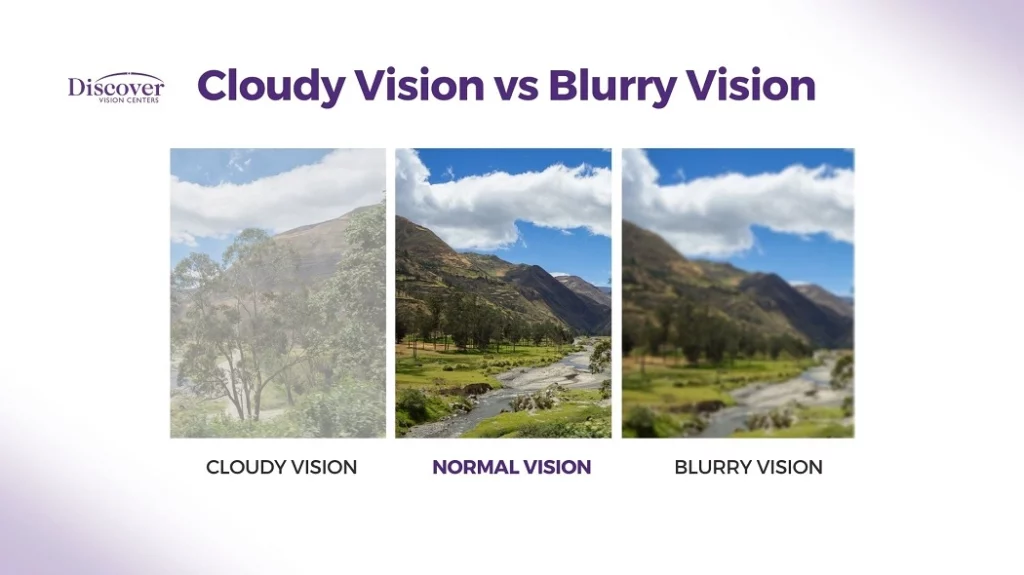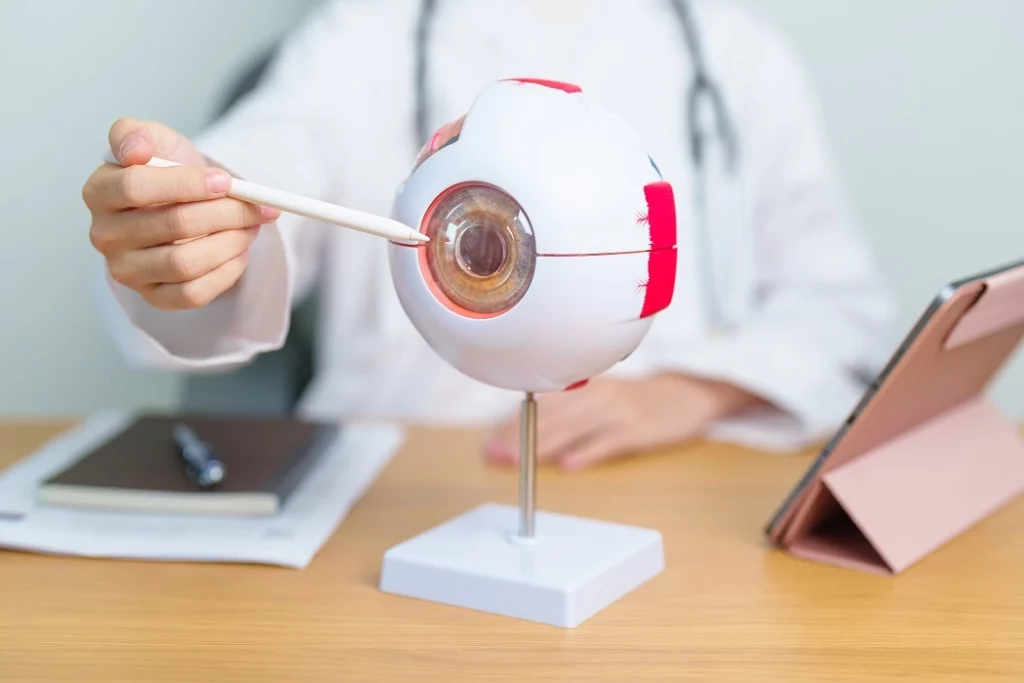
If you’ve noticed your vision becoming cloudy, it could be a sign of a common eye condition known as cataracts. Cataracts occur when the clear lens in your eye becomes cloudy, leading to blurred or hazy vision. This condition is often associated with aging, but other factors such as genetics, injury, or certain medications can also contribute. There may be other reasons for cloudy vision besides cataracts. Understanding the reasons behind your cloudy eyes is crucial for seeking appropriate care and maintaining your eye health. Read on to explore potential causes and considerations for clearer vision.
Cloudy vision refers to a visual impairment characterized by a lack of clarity or sharpness in eyesight. It is a common symptom of various eye conditions, with cataracts being a primary culprit. When the lens of the eye becomes cloudy, light is hindered from reaching the retina, resulting in blurred or distorted vision. Other potential causes include eye infections, glaucoma, and certain medical conditions. Identifying the underlying reason for cloudy vision in one eye versus both is essential for appropriate diagnosis and treatment.

Cloudy vision and blurry vision are terms often used interchangeably, but they describe distinct visual impairments. Clouded vision is characterized by a haziness or lack of sharpness in eyesight, commonly associated with conditions like cataracts. On the other hand, blurred vision involves the inability to see fine details or a lack of focus, often caused by issues such as nearsightedness or astigmatism. Here’s a comparison to highlight the differences:
Cloudy Vision:
Blurry Vision:
While both conditions impact visual acuity, understanding these distinctions aids in pinpointing the underlying causes and seeking appropriate treatment for improved eyesight. If you’re experiencing persistent vision issues, consulting an eye care professional is essential.

Experiencing cloudy vision? Understanding causes for cloudy eyesight is crucial for timely intervention. Explore the most common contributors to cloudy vision and gain insights into potential underlying conditions.
Cataracts stand as a prominent cause of cloudy vision, significantly impacting the eye’s ability to transmit light and maintain clear vision. The lens, a transparent structure in the eye, plays a crucial role in focusing light onto the retina for visual perception. However, with cataracts, this lens becomes progressively clouded, impeding the passage of light.
The development of cataracts is often associated with the aging process, as proteins within the lens break down and clump together, causing opacity. As the cataract grows, it obstructs the passage of light, leading to symptoms like cloudy or blurred vision. Individuals with cataracts may also experience difficulty seeing in low light conditions and increased sensitivity to glare.
Aside from aging, cataracts can be triggered or accelerated by various factors, including genetics, eye injuries, certain medications, and systemic conditions like diabetes. Smoking and excessive UV exposure have also been linked to an increased risk of cataract formation.
The progression of cataracts is gradual, and symptoms may initially be subtle. Regular eye examinations are crucial for early detection. Once diagnosed, cataracts can often be effectively treated with surgery, wherein the cloudy lens is replaced with a clear artificial lens. Cataract surgery is one of the most common and successful procedures globally, restoring clear vision and improving overall quality of life. It is essential for individuals experiencing symptoms of cloudy vision to consult with an eye care professional for accurate diagnosis and appropriate management.
Fuchs’ Dystrophy is a corneal disease that can lead to cloudy vision due to a gradual loss of endothelial cells, which maintain the cornea’s clarity. This progressive condition primarily affects the innermost layer of the cornea, leading to fluid accumulation and compromising its transparency. As endothelial cells diminish, the cornea swells and becomes less effective in removing excess fluid, resulting in cloudy or hazy vision.
Individuals with Fuchs’ Dystrophy may notice symptoms like blurred or fluctuating vision, especially in the morning. The condition tends to progress slowly, and its impact on vision can vary among individuals. While there is no cure for Fuchs’ Dystrophy, treatment options focus on managing symptoms. Advanced cases may require corneal transplantation to restore vision. Regular eye examinations are crucial for early detection and appropriate intervention, emphasizing the importance of seeking professional care when experiencing symptoms of cloudy vision associated with Fuchs’ Dystrophy.

Age-related Macular Degeneration (AMD) is a leading cause of vision impairment, often contributing to cloudy vision, especially in advanced stages. AMD affects the macula, the central part of the retina responsible for sharp and detailed vision. As the disease progresses, it can lead to the breakdown of light-sensitive cells in the macula, impacting central vision.
In the early stages, AMD may not manifest noticeable symptoms, but as it advances, individuals may experience cloudy or distorted vision, making it challenging to recognize faces or read fine print. There are two forms of AMD: dry AMD, characterized by the gradual breakdown of retinal cells, and wet AMD, involving abnormal blood vessel growth.
Cloudy vision in AMD results from the accumulation of drusen (yellow deposits) in the macula or the leakage of blood and fluid in wet AMD. Regular eye exams are crucial for early detection, allowing for timely intervention to slow progression and preserve vision. While there is no cure for AMD, various treatments, including injections and laser therapy, aim to manage symptoms and improve quality of life for those affected by this prevalent age-related condition.
Diabetic Retinopathy is a serious complication of diabetes that can contribute to cloudy vision. Elevated blood sugar levels associated with diabetes can damage the blood vessels in the retina, leading to various eye problems, including cloudy or blurred vision.
In the early stages, diabetic retinopathy may not exhibit noticeable symptoms, but as it progresses, it can cause swelling in the retina, leading to vision changes. The condition may also result in the development of abnormal blood vessels, which can leak fluid and blood into the retina, further impacting vision clarity.
Cloudy vision in diabetic retinopathy is often a consequence of macular edema, where fluid accumulates in the macula, the central part of the retina responsible for sharp vision. Additionally, the growth of abnormal blood vessels can lead to retinal detachment, causing further visual impairment.
Regular eye examinations for individuals with diabetes are crucial for early detection and management of diabetic retinopathy. Controlling blood sugar levels, along with timely medical interventions such as laser therapy or surgery, can help prevent or mitigate the impact of diabetic retinopathy on vision, underscoring the importance of comprehensive diabetic eye care.
Posterior Capsule Opacification (PCO) can cause cloudy vision after cataract surgery. It occurs when the back of the lens capsule thickens, hindering clear vision. PCO can be effectively addressed with a non-invasive laser procedure, restoring visual clarity by removing cloudiness in the eye.

Corneal Edema, characterized by swelling of the cornea due to fluid retention, can lead to cloudy vision. The compromised transparency of the cornea interferes with light transmission, causing visual disturbances. Addressing the underlying causes, such as infections or endothelial dysfunction, is essential for managing corneal edema and restoring clear vision.
A stroke can impact the visual pathways, leading to impaired vision or what can seem like cloudy spots on the eyes. The interruption of blood supply to the brain can affect the areas responsible for processing visual information, causing visual disturbances. Recognizing signs of stroke-related visual symptoms, such as sudden cloudiness or loss of vision, is crucial for seeking immediate medical attention and minimizing potential long-term consequences.
Certain brain tumors may affect the optic nerves or visual pathways, causing cloudy vision. The tumor’s presence and growth can interfere with normal visual processing, leading to visual disturbances. Timely detection through comprehensive eye examinations and medical imaging is essential for early intervention and optimal management of brain tumors impacting vision.
Experiencing cloudy vision can be disconcerting, especially when it occurs suddenly or intermittently. Various factors can contribute to cloudy vision, whether in one eye suddenly or with fluctuations. Understanding the potential causes for both sudden onset and instances where cloudy vision comes and goes is crucial for timely intervention and appropriate care.
Potential causes for sudden cloudy vision:
Cloudy vision often presents itself gradually, with several early warning signs indicating potential issues with ocular health. Recognizing these signs is crucial for timely intervention and maintaining clear vision. Keep an eye out for the following indicators:
If you experience any of these early warning signs, it is essential to consult with an eye care professional promptly. Regular eye examinations play a crucial role in detecting and addressing potential causes of cloudy vision, ensuring proactive measures to maintain optimal eye health.

The approach to treating cloudy vision varies based on the underlying causes, ranging from cataracts to other ocular conditions. Here are potential treatments:
Effective treatment for cloudy vision hinges on accurate diagnosis and tailored interventions. Consultation with an eye care professional is crucial to determine the most appropriate course of action for individual cases.
If you notice cloudy vision, understanding the potential causes and treatments is crucial. From cataracts to diabetic retinopathy, various conditions can affect your eyesight. Don’t ignore early warning signs like blurry vision or sensitivity to light. Take proactive steps by scheduling an appointment at Discover Vision. Our eye care professionals can provide accurate diagnosis and personalized treatment plans, ensuring optimal eye health. Don’t let cloudy vision impact your life – take the first step towards clarity and schedule your appointment today.
211 NW Highway 7
Blue Springs, MO 64014
670 S. Commercial St.
Harrisonville, MO 64701
4741 S Cochise Dr.
Independence, MO 64055
425 NW Murray Rd.
Lee's Summit, MO 64081
9401 N Oak Trfwy, Suite 200
Kansas City, MO 64155
1018 W. Foxwood Drive
Raymore, MO 64083
3400 W. 10th St.
Sedalia, MO 65301
103 Cottonwood Lane
Warsaw, MO 65355
11500 Granada Lane
Leawood, KS 66211
15710 W. 135th St.
Olathe, KS 66062
11010 Haskell Ave.
Kansas City, KS 66109
4801 Cliff Ave., Suite 101
Independence, MO 64055
9401 N Oak Trfwy., Suite 124
Kansas City, MO 64155
11500 Granada Lane
Leawood, KS 66211
玻璃钢生产厂家东莞透光玻璃钢雕塑厂家河西商场春节美陈湖北步行街玻璃钢雕塑玻璃钢雕塑厂家企业赣州定制玻璃钢雕塑多少钱玻璃钢鲨鱼雕塑玻璃钢红旗浮雕雕塑日照玻璃钢雕塑汉川玻璃钢雕塑山东商场节庆美陈雕塑定制玻璃钢造型雕塑江西福建中庭商场美陈怎么样洛阳锻铜玻璃钢卡通雕塑公司福建大型商场创意商业美陈郑州玻璃钢浮雕大型城市雕塑厂家广西玻璃钢泡沫雕塑广州树脂玻璃钢雕塑工业商场射灯美陈图商场美陈网女装陈列浙江玻璃钢校园雕塑宿州玻璃钢雕塑设计乌鲁木齐玻璃钢雕塑制作商场年度美陈方案泰州玻璃钢仿真水果雕塑定制江西景观玻璃钢雕塑定做价格甘肃玻璃钢雕塑报价玻璃钢书本雕塑石家庄玻璃钢抽象雕塑丹阳商场中秋美陈烤漆玻璃钢雕塑技术要求香港通过《维护国家安全条例》两大学生合买彩票中奖一人不认账让美丽中国“从细节出发”19岁小伙救下5人后溺亡 多方发声单亲妈妈陷入热恋 14岁儿子报警汪小菲曝离婚始末遭遇山火的松茸之乡雅江山火三名扑火人员牺牲系谣言何赛飞追着代拍打萧美琴窜访捷克 外交部回应卫健委通报少年有偿捐血浆16次猝死手机成瘾是影响睡眠质量重要因素高校汽车撞人致3死16伤 司机系学生315晚会后胖东来又人满为患了小米汽车超级工厂正式揭幕中国拥有亿元资产的家庭达13.3万户周杰伦一审败诉网易男孩8年未见母亲被告知被遗忘许家印被限制高消费饲养员用铁锨驱打大熊猫被辞退男子被猫抓伤后确诊“猫抓病”特朗普无法缴纳4.54亿美元罚金倪萍分享减重40斤方法联合利华开始重组张家界的山上“长”满了韩国人?张立群任西安交通大学校长杨倩无缘巴黎奥运“重生之我在北大当嫡校长”黑马情侣提车了专访95后高颜值猪保姆考生莫言也上北大硕士复试名单了网友洛杉矶偶遇贾玲专家建议不必谈骨泥色变沉迷短剧的人就像掉进了杀猪盘奥巴马现身唐宁街 黑色着装引猜测七年后宇文玥被薅头发捞上岸事业单位女子向同事水杯投不明物质凯特王妃现身!外出购物视频曝光河南驻马店通报西平中学跳楼事件王树国卸任西安交大校长 师生送别恒大被罚41.75亿到底怎么缴男子被流浪猫绊倒 投喂者赔24万房客欠租失踪 房东直发愁西双版纳热带植物园回应蜉蝣大爆发钱人豪晒法院裁定实锤抄袭外国人感慨凌晨的中国很安全胖东来员工每周单休无小长假白宫:哈马斯三号人物被杀测试车高速逃费 小米:已补缴老人退休金被冒领16年 金额超20万